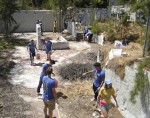Old age isn’t stopping UCLA from looking to party. The yearlong celebration of the university turning 100 recognize the school’s advancements, strides and accomplishments. The 100 festivities started Saturday.
These festivities come with four major initiatives, which UCLA hopes will advance knowledge, create opportunity through education and serve Los Angeles communities.
Yet, these are lackluster attempts at commemorating 100 years of UCLA’s commitment to service.
A century of UCLA should be a bit more personal and close to home. Yet the Centennial Celebration initiatives don’t have any direct effect on immediate Los Angeles communities. While the university has a huge involvement in outside communities through different organizations across campus, nothing is unified or large-scale – other than UCLA Volunteer Day, of course.
At the same time as making these outside efforts, UCLA also needs to care about its student body. Without community-student engagement, students lose the opportunity to build their own sense of home.
In order to continue its commitment to service, the university needs to lead the way, not stop and pat itself on the back. It needs to revitalize the significance volunteer work holds for the years to come. Efforts like Volunteer Day can be expanded beyond a single day that happens once a year.
And with the centennial being such a publicized year, there’s no better time to do so.
The celebration’s initiatives range from digitizing library resources through an initiative called “OpenUCLA” to another called “UCLA: Our Stories, Our Impact,” a multimedia traveling showcase. These initiatives’ common theme is reflection and discussion of equity and equality.
UCLA spokesperson Ricardo Vazquez said the Centennial Celebration Steering Committee received proposals last summer for collaborative programs that would advance the themes of the celebration.
“Proposals were evaluated for their ability to embrace the pillars of the celebration, address internal and external campus audiences, potential to engage the Los Angeles community, and foster equity and inclusion,” Vazquez said in an email statement.
And yet, these initiatives have no real engagement with the Los Angeles community.
“I believe that the university has a lot of work to do with community engagement,” said Ernesto Arciniega, director of diversity, inclusion and community engagement for the Graduate Students Association. “The administration has an obligation to collaborate and invite students to organize and to plan.”
It’s not as if UCLA is new to the idea of community service. The Volunteer Center, for example, has done tremendous amounts of work for the community. UCLA has the ability to significantly impact communities outside of the student body and Westwood during its centennial celebrations, yet chooses not to.
Despite the lack of meaningful gestures during its 100-year mark, UCLA has previously supported community service through programs like the Westwood Organized Meaningful Project. Although beneficial, UCLA’s involvement ended in 2014 due to its disorganized nature.
David Tracy, a UCLA alumnus, has been part of numerous volunteer programs during his time at UCLA, including WOMP.
“(Community work) doesn’t need to be traditional maintenance and gardening like WOMP,” Tracy said. “(It would) be more impactful to leverage strengths and skills where you can provide a service.”
WOMP, while a bit messy, was a keeper. It beautified the Westwood area and neighboring communities but it also allowed for the community to come together. Students and businesses understood that they all played a role in the improvement of the community. And instead of addressing WOMP’s flaws, it simply ended.
“(WOMP) was an effort by the Westwood Community Council to have a better connection between the students, neighborhood and community that they lived in,” Tracy said.
UCLA’s current volunteering targets the right place – schools. But it’s not going beyond the surface. Creating long-term, in-depth volunteer work can address the larger picture of diversity and equity. The university can engage students and staff to volunteer at under-resourced schools within the community.
Worldwide volunteer projects show the drive and commitment to service UCLA prides itself with. And it inspires the campus to look beyond the pristine brick walls of the communities they are part of.
“The Volunteer Center and the Center for Community Learning are among the most active units at UCLA encouraging community engagement,” said Alison Hewitt, a UCLA spokesperson. “Their work includes encouraging direct involvement in local communities.”
But this isn’t really the case. Encouragement first comes through visibility. The Centennial Campaign could have been used more effectively to create opportunities for volunteer and community work. The campaign had the ability to expand community work beyond beautification through yearlong community service initiatives.
But it didn’t.
“Lighting the way” is the the university’s centennial motto, but by choosing not to significantly involve itself in nearby communities, it’s doing everything but.
UCLA set out 100 years ago to light the way. It can share some of that brightness with the community too.
